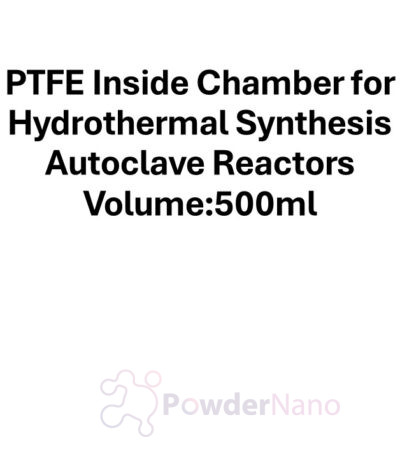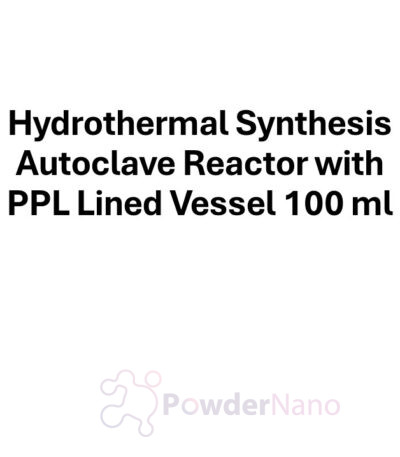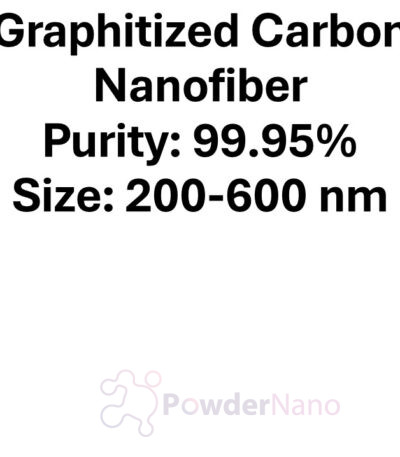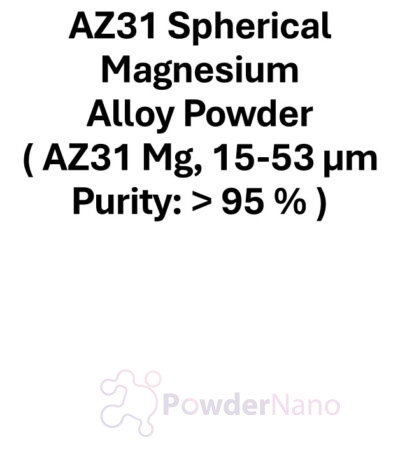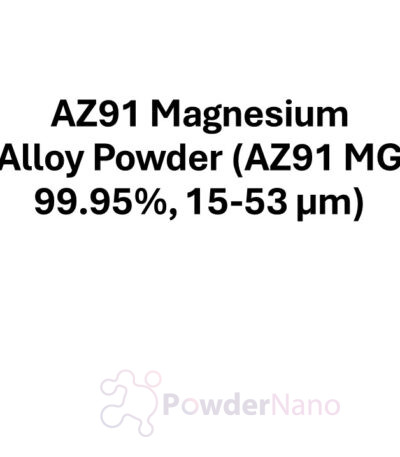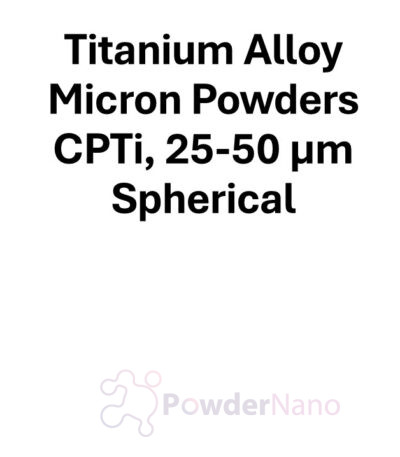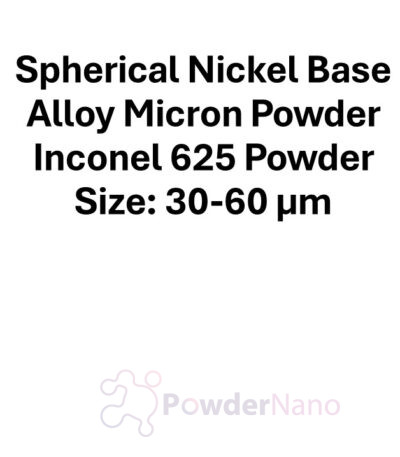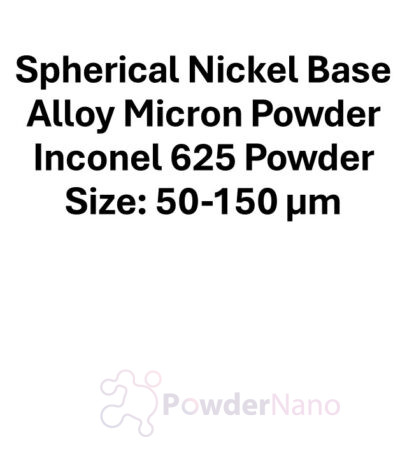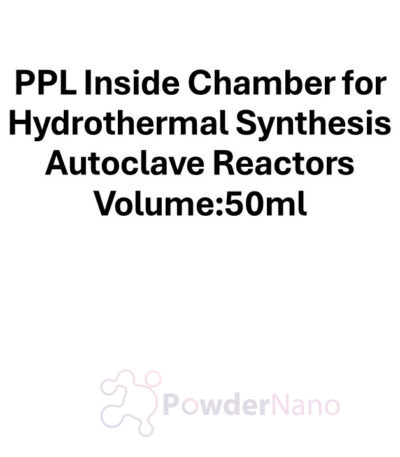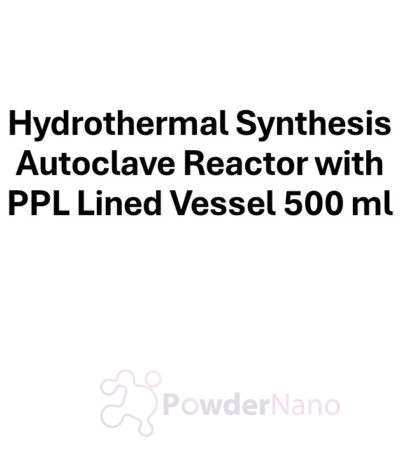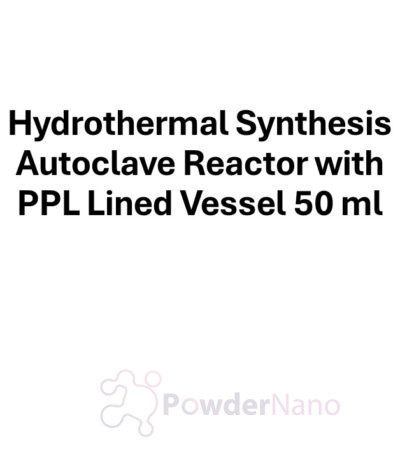Technical Specification:
- Material Composition:
- Outer Shell: High-strength stainless steel (commonly 304SS or 316SS).
- Provides excellent resistance to pressure, corrosion, and thermal stress.
- Inner Liner: Polyphenylene (PPL).
- Highly resistant to extreme chemical environments, outperforming PTFE in certain high-temperature and highly acidic conditions.
- Outer Shell: High-strength stainless steel (commonly 304SS or 316SS).
- Physical Dimensions:
- Vessel Volume: 50 mL.
- Suitable for small-scale synthesis and laboratory experiments.
- Wall Thickness (PPL Liner): Typically 2–5 mm, ensuring durability under extreme conditions.
- Outer Dimensions:
- Compact design optimized for laboratory use.
- Vessel Volume: 50 mL.
- Thermal and Pressure Ratings:
- Maximum Operating Temperature: 280°C–300°C (higher than PTFE-lined vessels).
- Maximum Pressure: 10 MPa (100 bar), allowing for high-pressure reactions.
- Thermal Stability:
- Excellent resistance to temperature fluctuations.
- Sealing Mechanism:
- High-strength threaded closure with a durable gasket or O-ring for airtight sealing.
- PPL liner isolates the reactants from the stainless steel body, ensuring compatibility with aggressive chemicals.
- Chemical Resistance:
- Exceptional Resistance:
- Handles highly acidic and alkaline solutions, making it suitable for aggressive chemical reactions.
- Non-Contaminating:
- Ensures pure reaction environments.
- Exceptional Resistance:
- Packaging:
- Supplied with necessary accessories, including wrenches for sealing, spare gaskets, and a user manual.
Applications:
- Primary Applications:
- Hydrothermal Synthesis:
- Ideal for the preparation of nanomaterials, advanced crystals, and other functional materials in a high-pressure, high-temperature environment.
- Solvothermal Reactions:
- Facilitates reactions in organic solvents under elevated conditions.
- Hydrothermal Synthesis:
- Industries:
- Material Science:
- Enables the synthesis of nanomaterials, graphene, and functional composites.
- Chemical Research:
- Supports high-pressure, high-temperature reaction studies.
- Geology:
- Simulates natural geological processes to grow minerals and crystals.
- Pharmaceuticals:
- Suitable for the crystallization and synthesis of high-purity substances.
- Material Science:
- Advantages for Applications:
- Higher Temperature Tolerance:
- PPL liners can withstand temperatures up to 300°C, making them ideal for reactions requiring elevated heat.
- Improved Chemical Resistance:
- Superior to PTFE in resisting highly acidic and oxidative environments.
- Compact Size:
- Perfect for small-scale research and exploratory experiments.
- Safety:
- Designed with safety features to handle extreme conditions.
- Higher Temperature Tolerance:
- Specialized Uses:
- Nanotechnology:
- Growth of nanowires, nanocrystals, and other advanced structures.
- Catalyst Synthesis:
- Creation of high-performance catalysts for industrial and research applications.
- Experimental Research:
- Supports reaction mechanism studies under extreme conditions.
- Nanotechnology:
- Challenges and Mitigation:
- Limited Volume:
- 50 mL capacity may be insufficient for larger-scale experiments.
- Solution: Use for R&D and scale up with larger reactors for production.
- 50 mL capacity may be insufficient for larger-scale experiments.
- Temperature Management:
- While PPL offers higher tolerance than PTFE, it still has thermal limits.
- Solution: Monitor and control temperature to avoid exceeding the safe range.
- While PPL offers higher tolerance than PTFE, it still has thermal limits.
- Liner Durability:
- PPL liners require careful handling to prevent scratches or damage.
- Solution: Handle gently and use non-abrasive tools for cleaning.
- PPL liners require careful handling to prevent scratches or damage.
- Limited Volume:
Summary:
The Hydrothermal Synthesis Autoclave Reactor with PPL Lined Vessel (50 mL) is a highly versatile tool for conducting high-temperature and high-pressure reactions. Its superior chemical and thermal resistance make it ideal for advanced material synthesis, nanotechnology, and experimental research. The small volume is perfect for laboratory-scale applications, offering reliable and efficient performance under extreme conditions.
